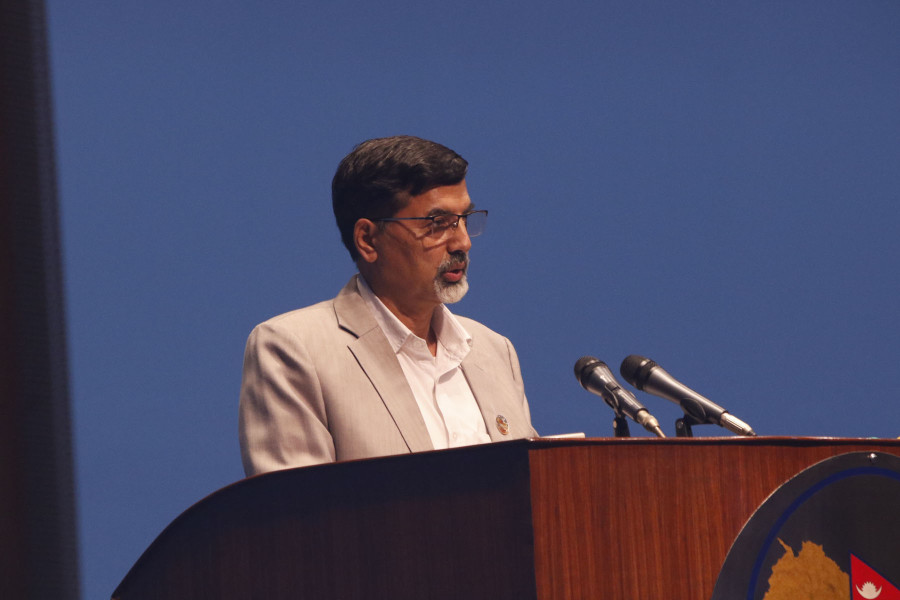National
Finance minister presents ordinances on budget at reinstated House
The erstwhile Oli-led government had introduced the budget on May 29 through an ordinance a week after the House was dissolved. Leaders say the option of presenting a supplementary budget remains.
Prithvi Man Shrestha
Despite the present ruling coalition’s earlier reservations over the introduction of the budget through an ordinance by the outgoing KP Sharma Oli-led government in May, Finance Minister Janardan Sharma on Sunday presented three budget-related ordinances at the joint session of the federal parliament held after the restoration of the House of Representatives by the Supreme Court.
There were expectations that the Nepali Congress-led government could bring a new budget or revise it.
The Oil government on May 29 had introduced a Rs1.64 trillion budget through an ordinance, as then prime minister Oli on May 21 had dissolved the House of Representatives for the fiscal year 2021-22, which began on July 16.
Finance Minister Sharma on Sunday presented the Financial Ordinance, Appropriation Ordinance and Ordinance on Raising Public Debts.
The Financial Ordinance has made provision of hiking or reducing the revenue rates and amended the existing revenue laws. The Appropriation Ordinance has authorised the government to spend from federal consolidated funds and allocate resources to various government agencies to provide services. The ordinance on Raising Public Debts has allowed the government to raise domestic debt.
Energy Minister Pampha Bhusal told the Post that the Cabinet on Saturday decided to register these ordinances at the Parliament as government agencies need to function and revenue should be raised.
“The ordinances needed to be tabled at the first meeting of the Parliament,” she said.
According to Article 114 (2) of the constitution, every ordinance should be tabled at the first meeting of the new session of both houses of the federal parliament.
After the Deuba government was formed on July 13, Finance Minister Sharma had indicated a new budget could be presented by scrapping the ordinances.
The ordinances were presented hours before Deuba’s floor test.
Even the Supreme Court made strong comments against running the state based on ordinances in its verdict on restoring the House of Representatives on July 12, saying that it is inappropriate and is against the representative governance system.
“It is not appropriate to dissolve the House of Representatives and give estimates of income and expenditure a legal form just a week ahead of the date of budget presentation and to introduce policies and annual programmes of long-term importance by a caretaker government instead of introducing expenditure arrangements for just compulsory liabilities of the government,” the court observed. “If such non-parliamentary practices are continued, they lead to the tendency of avoiding Parliament, devaluing constitutional provisions and exercising discretionary powers.”
Former finance minister Ram Sharan Mahat told the Post last week that the new government should introduce a full budget at Parliament.
“After the Supreme Court pointed out the move of introducing a full budget by avoiding Parliament as a fraudulent activity, the budget introduced by the outgoing government cannot be implemented,” he had told the Post.
As per the constitution, the annual budget should be presented at both houses of parliament on Jestha 15 (which fell on May 29 this year) every year. But, a week before the budget presentation date, President Bidya Devi Bhandari dissolved the lower house in midnight of May 21 and the budget was presented through the ordinance.
“It is not that we were in favour of the presentation of the budget through ordinance,” said Dev Gurung, chief whip of ruling CPN (Maoist Centre). “The government had to table the ordinance at the Parliament to follow the legal norms and procedures to take ownership of the expenditure and revenue collection made through the ordinance.”
He said that the new government could introduce a new budget or supplementary budget after getting the vote of confidence at the House of Representatives.
“But whether to introduce a new budget or supplementary budget is up to the new government to decide,” he said.
According to Gurung, the government can continue with the ordinance through a replacement bill too if it wants. After continuing the ordinance in the short term, the government also has the power to introduce a supplementary budget as per Article 121 of the constitution.
“The finance minister shall, in any financial year, present supplementary estimates before the House of Representatives, if it is found that the sum authorised to be spent for a particular service by the Appropriation Act for the current fiscal year is insufficient, or that a need has arisen for expenditure upon new services not provided for by the Appropriation Act for that year, or the expenditures made during that fiscal year are in excess of the amount authorised by the Appropriation Act,” reads Article 121 (1).




 22.59°C Kathmandu
22.59°C Kathmandu















